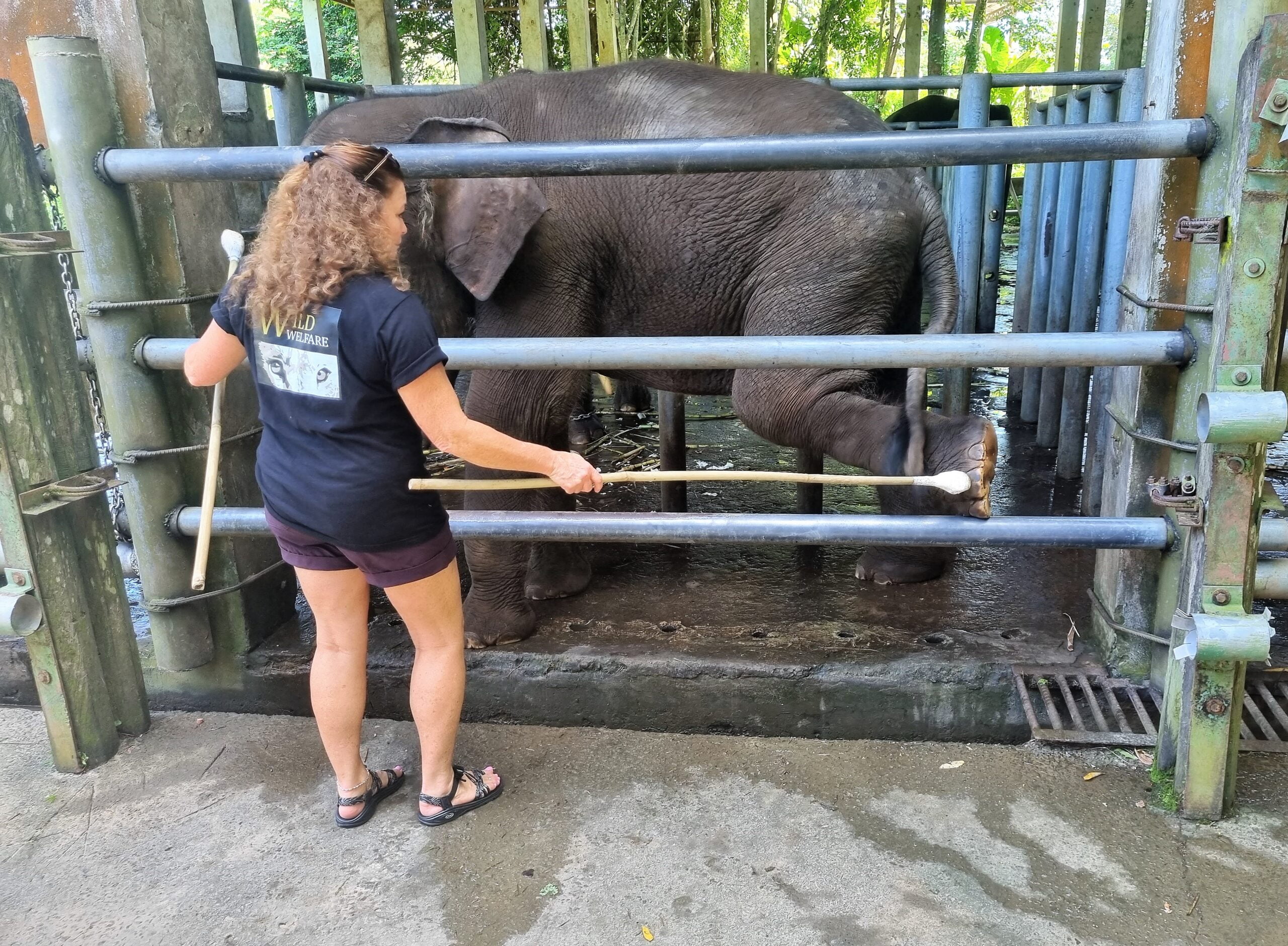Elephant Environments and Targeted Training in Sabah
Internationally active animal charity Wild Welfare has returned to Sabah for the second time this year in a recent visit to Lok Kawi Wildlife Park.
There were two focal priorities of the trip. Firstly, to finalize enclosure modification design plans to create better care opportunities, putting elephant welfare at the forefront of all management practices. Secondly, a continuation of the charity’s goal from the previous visit in March to introduce both care staff and elephants to the basics of Protected Contact management using positive reinforcement training (PRT).
The elephants at the facility, as with all captive elephants in Sabah, are rescue animals as a result of human/elephant conflict. Wild Welfare has held a long-term collaborative partnership with the Kota Kinabalu-based wildlife park, having offered support and guidance to staff and managers to drive forward animal welfare improvements over the past four years. The partnership and enclosure refurbishment work is generously supported by The Elephant Sanctuary in Tennessee by providing necessary financial assistance and technical expertise. Their Facility Director, Joe Rizzo, accompanied the Wild Welfare team – Margaret Whittaker (Director, Wild Welfare US) and Dave Morgan (Field Director, Wild Welfare) to Sabah in mid-July to focus specifically on the enclosure renovation developments.
These renovation specifics were detailed during the trip and deemed necessary to implement protected contact management (PC management) with the park’s 13 elephants which include eight bulls and five cows. Protected contact is a system for managing elephants that uses positive reinforcement training as the primary method to modify behaviour. Voluntary cooperation of the animal is gained through the use of rewards, and positioning is directed by targets with trainers functioning outside of the elephant social hierarchy.
During the visit, the team carefully assessed all of the existing enclosures for structural integrity, and in collaboration with world famous zoo architect John Coe, a design plan has been drawn up to effect an increase in holding space for the two bulls who live off-exhibit, allowing them to move freely off chains. The plan also incorporates the addition of protected contact training walls to accommodate the additional 11 elephants living both on and off-exhibit. Local contractors in Sabah have been hired to work on the project.
In addition to the physical and structural enhancements, the Wild Welfare team are placing a strong emphasis on building capacity within the care staff at Lok Kawi Wildlife Park by continuing to develop their skills using the techniques of PC elephant management. Training programmes like this one provide an opportunity for cognitive stimulation for the elephants by allowing them to experiment, learn and problem solve as they navigate through the process of ‘learning to learn’. In addition to the benefits of mental stimulation, individual elephants learn to take part in their own health care and management when they choose to voluntarily participate in training sessions; all of which occur without the use of force or coercion. The team are conducting two to six training sessions per day to advance the level of practical experience for the care staff and to continue to build the elephant’s repertoire of behaviours in protected contact.
“The elephants are learning at a rapid rate and showing tremendous enthusiasm to engage in PC training sessions. Staff show similar enthusiasm and practically pull the targets from our hands to give it a try themselves. What a joy to see!” Margaret Whittaker, Director, Wild Welfare US.
As well as enclosure improvements and training programme, the elephants have been receiving enrichment devices to encourage natural behaviours such as foraging, socialisation and play. The provision of enrichment will generate rewarding experiences for the elephants and ensure choices and challenges within their environment.
Wild Welfare currently works in over 10 different countries, driving forward animal welfare improvements for captive animals in zoos, aquariums, and sanctuaries. The charity is currently celebrating its 10 year anniversary, and initially began working in Sabah in 2016.
~ENDS~
Notes to Editors
For more information or interview requests please contact Wild Welfare on communications@wildwelfare.org
Wild Welfare is a global organisation committed to improving animal welfare for captive wild animals. By uniting the world’s leading zoos, zoo associations and animal welfare organisations, we build trusting partnerships that help provide long-term solutions to critical wild animal welfare issues.
Our vision is to end the suffering of captive wild animals around the world and ensure full and sustainable protection is given to all animals in human care. Find out more at wildwelfare.org. Registered charity in England (no.1165941).
Image: Wild Welfare’s Margaret Whittaker conducting PRT training with Oyoh the elephant. Targets are presented for Oyoh to touch and he can decide whether to engage or not. This positive training experience can aid health assessments and improved management practices without having to physically manipulate or force an elephant to undergo health checks. This training is not to produce ‘tricks,’ but rather to allow staff to work with the elephants in order to provide good quality care and create a positive relationship with them.





